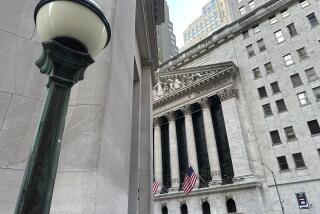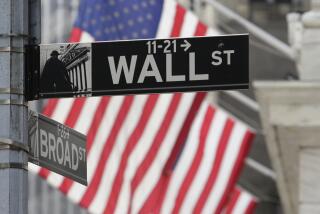Most Stocks Edge Higher; Bond Yields Slip : Market Overview
Most stocks edged higher as investors anxiously awaited April employment data, hoping for more indications about the strength of the economic recovery.
* The Treasury market, long accustomed to a stable supply of new bonds, was jolted by the government’s decision to eliminate seven-year notes and reduce sales of its bellwether 30-year bonds. Long-term bond yields edged lower.
* The dollar rose against most major currencies as interest in the greenback waned in favor of cross-trading in other currencies.
Stocks
Small issues again turned in the best performance, reflecting investor unease with the economy. It was the seventh straight gain for the NASDAQ average.
The Dow Jones average rose 2.91 points to 3,449.10 on Big Board volume of 274.24 million shares, up from 268.31 million in the previous session. Advancing issues outnumbered declines by about 13 to 9 on the New York Stock Exchange.
Investors were reluctant to commit significant amounts to the stock market ahead of Friday’s Labor Department data on employment, said James Solloway, director of research at Argus Research Corp.
Several reports recently have shown economic growth might be slowing.
But there have been bright spots. On Tuesday, data from auto makers showed strong auto sales in late April. And on Wednesday, the Federal Reserve said in a survey of regional business conditions that the economy improved modestly in April.
Solloway said the relatively good performance of the market shows prices have fallen far enough in the last two months to buffer the market from disappointment.
Stocks traded on the NASDAQ rose 5.11 to 683.27 after jumping more than 11 points on Tuesday. The more volatile average is dominated by smaller, mostly technology companies and in a slow economy, investors often look to more aggressive growth companies, analysts said.
Among the market highlights:
* Forest product companies, heavily subject to the economic cycles, fell. Georgia Pacific lost 2 1/4 to 63 7/8, Louisiana Pacific dropped 5 3/8 to 64 3/4, and Weyerhaeuser tumbled 2 to 43 1/8.
* Airline shares also fell after an analyst downgraded the stock of United Airlines and AMR, the parent of American Airlines. Delta Air Lines fell 1 5/8 to 58 1/4, United Airlines tumbled 2 3/4 to 133 1/2, and AMR dropped 5/8 to 67 3/8.
Cable stocks fell after analysts took another look at the new Federal Communications Commission regulations for the industry and decided they weren’t so favorable after all. The stocks jumped Tuesday after the new rules came out.
* Time Warner fell 2 to 34 1/8, and Tele-Communications Inc. dropped 1 3/4 to 19 3/4.
* In other actively traded NYSE issues, Unilever rose 5/8 to 112 7/8 in dividend-related trading.
* Philips, the Dutch electronics manufacturer, rose 1 1/8 to 15 3/4 after releasing earnings that were lower, but in line with expectations.
* ITT rose 3 to 83 3/4. The company said it has entered a preliminary agreement to sell its ITT Consumer Financial Corp. unit’s domestic unsecured consumer small loan portfolio.
* In NASDAQ trading, 3DO, the San Mateo multimedia company that went public Tuesday, rose 3 3/4 to 24. The company issued 2.9 million shares, with an initial pricing of $15 each.
Overseas, shares closed lower in London, but well above the day’s lows. The Financial Times 100-share average finished 16.1 points lower at 2,796.5. Frankfurt’s DAX 30-share average retreated 4.21 points to 1,623.16. All financial markets in Japan were closed for Children’s Day, a national holiday. The markets reopens today.
Credit
The Treasury’s announcement, which ordinarily might have triggered a rally, sent bond yields and prices see-sawing in afternoon trading as market participants grappled with the biggest change in Treasury supply in years.
Prices ended mixed and only modestly changed as traders reasoned that the reduction in long-term supply will not be fully felt until the fourth quarter.
The yield on the Treasury’s main 30-year bond slipped to 6.78% from 6.79% on Tuesday. Its price, which moves in the opposite direction of the yield, closed up 1/8 point, or $1.25 per $1,000 in face value.
Prices of Treasury notes and bills, meanwhile, slipped on fears that the new strategy will require a big increase in sales of the shorter-term maturities, which could dilute their value. Despite the cut in long-term bonds, federal borrowing is expected to swell.
Activity was described as chaotic as traders struggled to assess the Treasury’s afternoon announcement.
The federal funds rate, the interest on overnight loans between banks, fell to 2.813% from 2.938%.
Other Markets
The focus of the currency markets was the German mark, which has set the tone of currency trading for some time. The mark fell amid concerns about a continuing strike by metal workers in eastern Germany.
It is feared the strike could help deter the economic recovery in the formerly Communist region and in turn hurt the entire German economy.
The dollar was quoted at 1.578 German marks in New York, up from 1.570 marks late Tuesday. The greenback rose to 110.55 Japanese yen, up from Tuesday’s 110.25. The British pound fell to $1.565 from $1.566.
Meanwhile, in commodities trading, the stronger dollar pushed gold futures lower on New York’s Commodity Exchange, while silver rebounded from its oversold condition. Gold for current delivery dropped 20 cents an ounce to $354.60, while silver rose to $4.290 an ounce, up from $4.266 late Tuesday.
June light, sweet crude oil was 7 cents higher at $20.47 a barrel.
Market Roundup, D8
More to Read
Inside the business of entertainment
The Wide Shot brings you news, analysis and insights on everything from streaming wars to production — and what it all means for the future.
You may occasionally receive promotional content from the Los Angeles Times.










